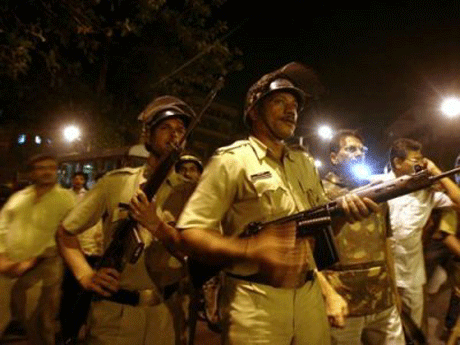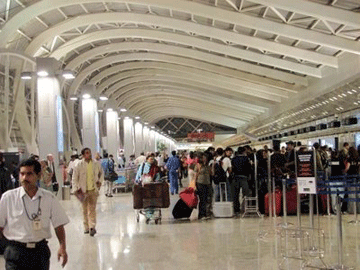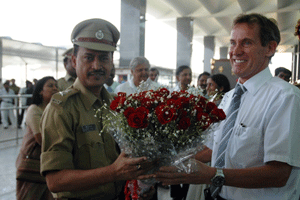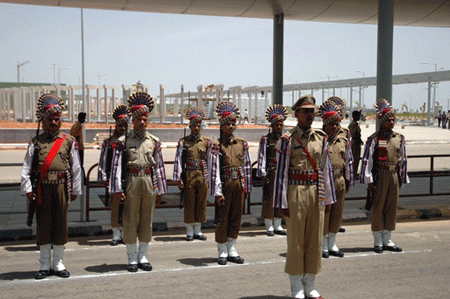
New Delhi Exclusive—Amidst
some new threats as this is written, conditions although calm, remain
somewhat dazed and confused as India recovers and security agencies
get a grip after that horrible Mumbai massacre by terrorist attacks
that shook India and the world, leaving more than 200 dead and a large
number grievously injured.
Now a week after the attacks the security
scenario seems to be improving.
While there have been lapses on the part
of intelligence agencies, the
police on the streets have become more vigilant with public places
like malls, airports, railway stations and markets under close scrutiny.
Every airport in the country has been
put under 'red alert' as high-security zones.
 In
the case of Mumbai, the Chatrapati Shivaji International Airport, In
the case of Mumbai, the Chatrapati Shivaji International Airport,
which saw a few flights taking off and landing during the three-day
siege, is apparently ready for any kind of terror strike, according
to
the Central Industrial Security Force (CISF), the outfit charged with
handling security at all airports around the country.
 “A
red alert has been sounded,” Digvijay Singh, commandant, Central
Industrial Security Force,(pictured here) in charge of security at the
Bengaluru International Airport told reporters. “A
red alert has been sounded,” Digvijay Singh, commandant, Central
Industrial Security Force,(pictured here) in charge of security at the
Bengaluru International Airport told reporters.
“This is due to some intelligence
inputs suggesting there will be attacks on the airport.”
In addition to the stationing of the elite
National Security Guard (NSG), the CISF and those manning the security
at airports have brought in a slew of security measures that the bosses
in the Delhi headquarters of the outfit are unwilling to enumerate to
this reporter.
While a “take our word for it”
bravado seems less than reassuring after what has just happened, other
security experts say that among enhanced counter terrorism measures
are regular patrols by plain-clothes security personnel at the airport
and a number of checks on the airport road with each vehicle entering
or going in or out of the airport premises being thoroughly screened.
From what we saw on Thursday December
4, police personnel here are spot-checking everyone.
Any suspicion results in a complete check
of the person's baggage before entry is allowed.
Security agencies in India have increased
anti-sabotage units at airports and extra policemen have been deployed.
 Commandos
armed with AK-47 rifles are in evidence at India’s major airports
as well. Commandos
armed with AK-47 rifles are in evidence at India’s major airports
as well.
In-airport security measures include frisking
of passengers and searching of cars.
The dog and bomb squads have also been
put on stand-by along with the anti-hijack and anti-sabotage teams.
A new measure that has been introduced
is the random check of passports.
Similar measures have also been undertaken
at Delhi's Indira Gandhi International Airport as well as other metro
airports in the country.
At the height of the Mumbai attacks, Air
Cargo News FlyingTypers was at Delhi airport at around 11 at night
and it seemed impregnable.
Visitors who had come to receive passengers
arriving on international flights were barred from entering the arrival
lounge.
As a result there were hordes of people
on the porch facing the city-side. Inside, there were three or four
layers of security that one had to go through.
The Bureau of Civil Aviation Security,
which is the organization responsible for planning security arrangements
for airports and air traffic, has as the result of the Mumbai disaster
sent out an advisory ordering domestic air travelers to carry valid
identification papers. It has also asked air carriers to increase the
number of armed air marshals on board all India flag aircraft.
Earlier, passengers were meant to report
an hour earlier for flights. Now, they have been asked to report at
least two hours before flights to complete security checks.
The airports in the country – especially
those in the metro cities – have been on high alert since the
serial blasts in Delhi and the new security measures follow a high-level
meeting chaired by the Secretary, Ministry of Civil Aviation, Madhavan
Nambiar.
Among the others who attended the meeting
were the Commissioner of Civil Aviation Security, the Director-General
of Civil Aviation, the Inspector-General (Airports) of the CISF and
personnel from the Airports Authority of India (AAI).
The heightened security measures have
affected air cargo shipments but it has not dampened the spirits of
air cargo carriers.
Express providers like DHL and its local
partner, Blue Dart, TNT, FedEx and UPS felt the effects of the Mumbai
attack for the first 48 hours. However reportedly all deliveries to
the rest of the country from these providers continued without a break.
Cargo continued to flow from Indian airports
even during the height of the terrorist attacks.
No question that for some time as the
horrible vision of those luxury hotels under siege went out to the world,
people were frightened and horrified at the same time.
But an underpinning of firm resolve to
continue also took hold as the airport communities vowed to keep operating
with renewed emphasis on heightened vigilance.
In a rush of events we are mourning our
losses while getting a grip on a new reality of life here.
Change made a devastating house call on
everybody in our vast land of India last week.
Tirthankar Ghosh
|
|



